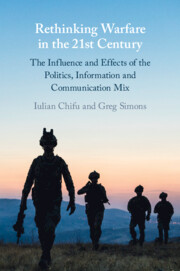 Rethinking Warfare in the 21st Century
Rethinking Warfare in the 21st Century Book contents
- Rethinking Warfare in the 21st Century
- Rethinking Warfare in the 21st Century
- Copyright page
- Dedication
- Contents
- 1 Introduction: Motivation, Purpose and Structure of the Book
- 2 Informational Warfare: A Theoretical Approach
- 3 Understanding Political and Intangible Elements in Modern Wars
- 4 The Fourth Generation of Informational Warfare
- 5 The Culture and Language of Contemporary Armed Conflict
- 6 Different Shades of Information and Communication in Armed Conflict: White, Grey and Black
- 7 The Effects of Technological Evolution and Social Media on the Individual, Society and Politics
- 8 Western Hybrid Warfare: Crisis and Subversion in Regime Change
- 9 Geopolitics in the Age of Social Media: The Struggle for Influence on Ukraine
- 10 The Ukrainian and Syrian Conflicts: Civil Wars or Geopolitical Shatterbelts?
- 11 The Impact of the COVID-19 Pandemic on Humankind, Society, and Politics
- 12 Conclusion: Summing Up the Knowledge and Answering the Questions
- Index
- References
1 - Introduction: Motivation, Purpose and Structure of the Book
Published online by Cambridge University Press: 29 June 2023
- Rethinking Warfare in the 21st Century
- Rethinking Warfare in the 21st Century
- Copyright page
- Dedication
- Contents
- 1 Introduction: Motivation, Purpose and Structure of the Book
- 2 Informational Warfare: A Theoretical Approach
- 3 Understanding Political and Intangible Elements in Modern Wars
- 4 The Fourth Generation of Informational Warfare
- 5 The Culture and Language of Contemporary Armed Conflict
- 6 Different Shades of Information and Communication in Armed Conflict: White, Grey and Black
- 7 The Effects of Technological Evolution and Social Media on the Individual, Society and Politics
- 8 Western Hybrid Warfare: Crisis and Subversion in Regime Change
- 9 Geopolitics in the Age of Social Media: The Struggle for Influence on Ukraine
- 10 The Ukrainian and Syrian Conflicts: Civil Wars or Geopolitical Shatterbelts?
- 11 The Impact of the COVID-19 Pandemic on Humankind, Society, and Politics
- 12 Conclusion: Summing Up the Knowledge and Answering the Questions
- Index
- References
Summary
The reason and motivation behind researching and writing the book is presented, along with a description of the individual chapter content. A series of research questions are posed, with the intended purpose and role of bringing together the diverse content and analysis that is presented across the chapters.
- Type
- Chapter
- Information
- Rethinking Warfare in the 21st CenturyThe Influence and Effects of the Politics, Information and Communication Mix, pp. 1 - 19Publisher: Cambridge University PressPrint publication year: 2023
